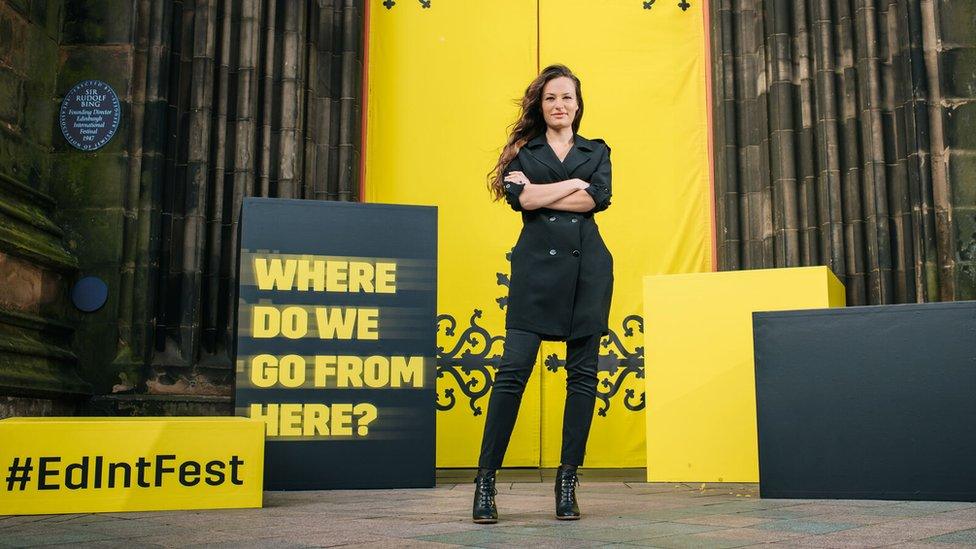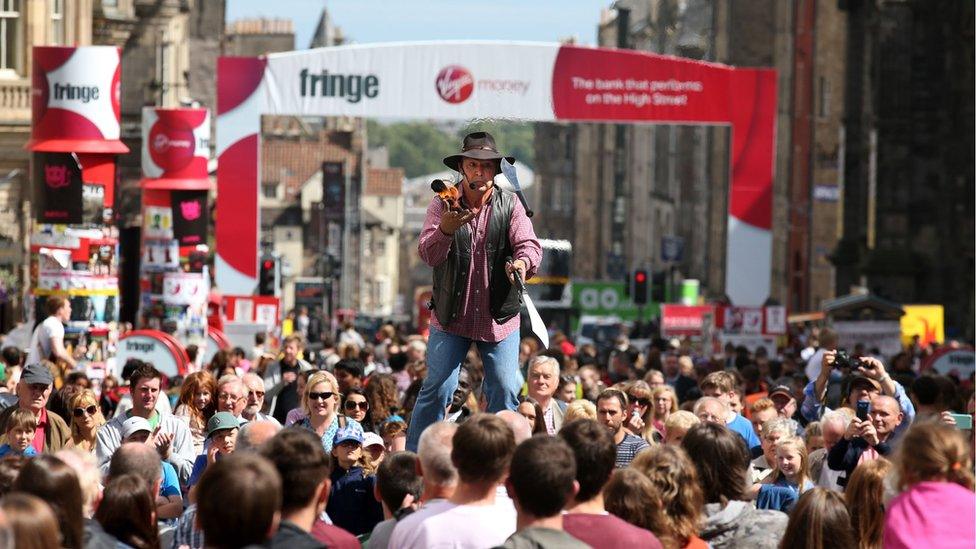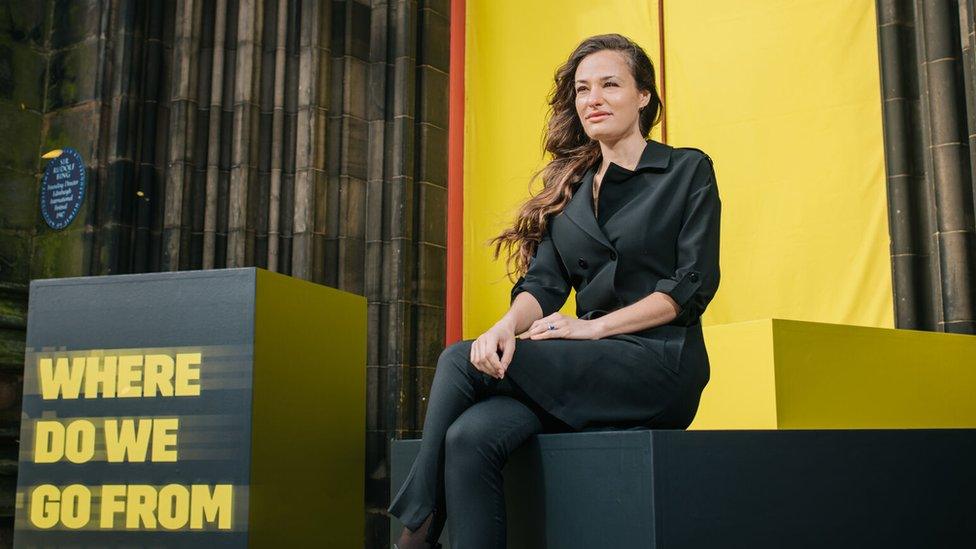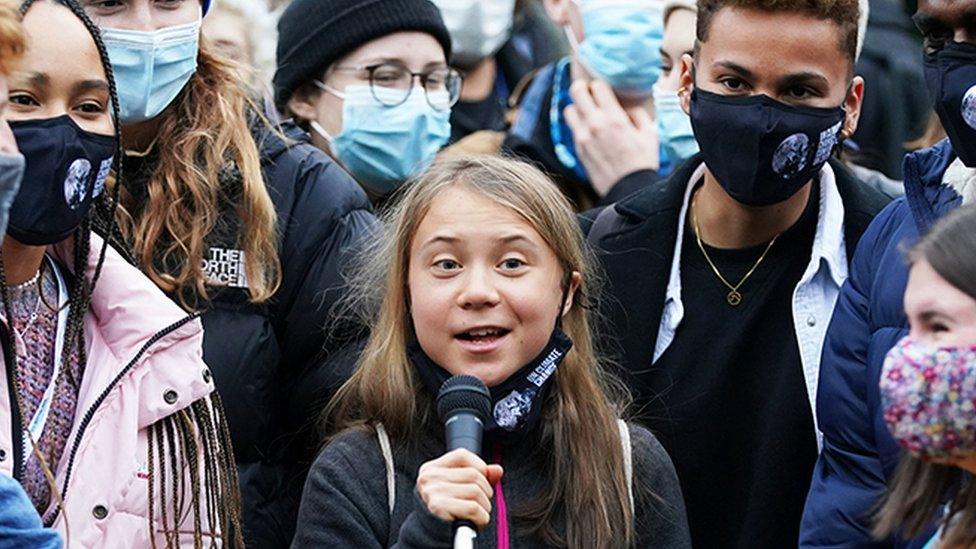Edinburgh festivals rebound but still 'precarious'
- Published

Edinburgh International Festival director Nicola Benedetti
Edinburgh's festivals had a robust rebound after the Covid pandemic but international audiences have not yet recovered, according to a new report.
The impact study into all the city's 11 annual festivals said more than 700,000 people went to events in 2022, totalling 3.2 million attendances.
It said almost half the attendances were by people who lived in Scotland.
Julia Amour from Festivals Edinburgh said the comeback was good but finances were still precarious.
The study, the third carried out by BOP Consulting in the past 13 years, looked at all Edinburgh's festivals from the Science Festival in April to Hogmanay in December.
It also took in all the famous summer festivals including the Fringe and the International Festival.
It surveyed 22,000 people across the 11 festivals in 2022 and found a robust rebound in attendances, despite events only able to stage three-quarters of their pre-pandemic programmes.
The report said Edinburgh's festivals boosted the city's economy by £407m in 2022, despite still being in recovery after the pandemic.
Previous studies have focused on the impact of visitors' money, but with international travel still limited, the study was able to identify the extent of local spending.
Ms Amour said: "We've always had more than half of our audience come from Edinburgh and Scotland but that's not always been recognised."

Most festivals are able to stage about three-quarters of their pre-Covid programme
Jonathan Todd, chief economist at BOP Consulting, said the results were even more impressive, given the circumstances of 2022.
He said: "When we think back to the end of 2021, we had that Omicron wave. It was only three months later that the Edinburgh Science Festival began.
"All the festivals showed tremendous agility so soon after Covid and there is scope for further recovery now that international travel has returned."
He said the average spend was £80, up from £50 in 2015, but inflation was a factor.
Once that is taken into account, the increase in spend is about 19%.
But inflation, and cost of living, are also having an impact on the festivals themselves.
The financial crisis and a squeeze on public funding means they are working with much more restrictive budgets.
Further challenges
"The fact we came back at 70% of the pre-Covid offer was a reset moment, and it's great we were able to do it," Ms Amour said.
"But the cultural sector is still hanging by a pretty precarious financial thread.
"We want to see a responsible recovery with this report and we know it can be done if we get the sort of long-term backing the cultural sector deserves."
There are further challenges ahead, particularly the rising cost of accommodation and proposed changes to short-term letting legislation.
The cancellation of the 2020 festivals in Edinburgh was unprecedented. The scaled-back outdoor events of 2021 were only possible because of emergency funding from public bodies including the Scottish government, Creative Scotland and Edinburgh City Council.

Performances take place in Edinburgh's High Street during the festival
Many saw it as important reset moment for the older festivals, which began in 1947 in equally challenging times and at much smaller scale.
But their survival this far, doesn't mean their future is secure.
"It's true that the festivals would not have survived without emergency funding but there were casualties," Ms Amour said.
"In 2020 a third of the creative arts workforce lost their livelihoods.
"It's an industry which combines agility and fragility so it's important to set the compass for sustainable recovery for creative workers and those involved in the festivals."

In 2015, after publication of the previous impact study, the festivals set out a 10-year strategy for growth and development.
That was curtailed by Covid, and last summer, they replaced it with a 2030 Vision, whose ambitions included being globally-minded, locally-rooted, and creatively-led.
"We're projecting that this year's festivals will be at same scale as last year," Ms Amour said.
"The cost inflation is twice the level of general inflation. There are a lot of challenges.
"We have shown that we can be an unparalleled cultural asset for Scotland, we have been for over 75 years, and with this report it sets the context for how we can be that for the next 75 years."
Simon Gage, the director of the Edinburgh Science Festival, said the festivals provided a "breath-taking cultural offer" and should not be taken for granted.
"The reason we haven't come back to full-scale is that costs have gone up, materials, venues, fuel and income sources are not going up at the same speed," he said.
"The fabric of the organisations who stage the festivals is beginning to look wobbly and there are more pressures to come.
"We're happy being a little smaller, whether that's fine for everyone else is another matter, but even if we stay small, it's still a worry.
"Accommodation costs are going to go up. We may have to shrink again to absorb these extra costs."
Culture Secretary Angus Robertson said: "This report highlights the major impact of Scotland's international festivals, which contributed £407m to the Edinburgh's economy last year, and a further £367m across the country, supporting thousands of jobs and businesses.
"Throughout the pandemic, the Scottish government provided £256m of additional support for the culture sector, with approximately £14.1m for festivals since the start of the pandemic and an addition £2.1m for the EIF, Fringe, and Film Festival in 2022 for their 75th anniversaries.
"We recognise the impact of the pandemic and cost of living crisis, and are currently reviewing the national events strategy with VisitScotland and the sector to ensure Scotland continues to be the perfect stage for events."
Related topics
- Published24 April 2023

- Published1 June 2023

- Published15 March 2023

- Published29 August 2022
